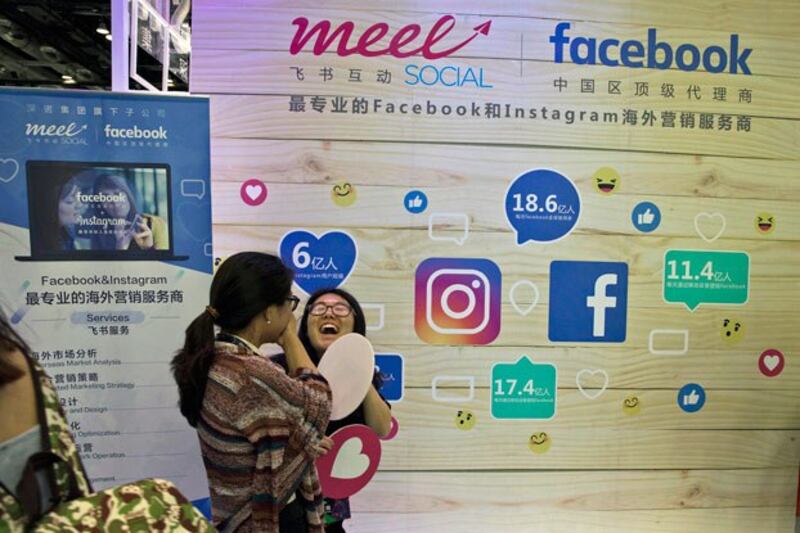Three decades after internet access first became available in China, the country has more than a billion people online, with a thriving e-commerce sector and several massively popular homegrown social media platforms.
But despite early hopes that widespread public internet access would make censorship and political control by the ruling Chinese Communist Party harder and harder to enforce, the authorities have spent the past 30 years developing ever more effective ways to monitor and censor everything Chinese citizens do online.
Since Chinese Communist Party leader Xi Jinping took power in 2012, he has turned China into a high-tech surveillance state in which online anonymity is all but impossible, and the tools used to circumvent the Great Firewall of censorship have been outlawed, analysts told Radio Free Asia in recent interviews.
"Everything has become more repressive, including the internet," Joshua Kurlantzick, senior fellow for Southeast Asia at the Council on Foreign Relations in Washington, told RFA Mandarin. "There's been a crackdown on using remote access, there's much more surveillance – there's much more surveillance on WeChat."
The list of potential legal offenses that users behind the Great Firewall can commit online is long, and ranges from insulting revolutionary heroes and the official version of China's recent history, its flag and national emblems, subverting or inciting others to subvert state power by calling for democratic governance or greater official accountability, and the catch-all criminal charge for perceived troublemakers, "picking quarrels and stirring up trouble."
Users can't depict " Winnie the Pooh" in any form. Xi Jinping is particularly sensitive to any form of satire, and Chinese censorship has spread as far as YouTube, which has taken down channels belonging to overseas satirists engaged in "Xi-bashing."

There are even plans to ban " hurting the feelings of the Chinese people," which could include designing clothing that looks like a Japanese army uniform from World War II, or making memes referencing the malaise of young people by calling them " the last generation."
In November, food blogger Wang Gang was forced to apologize for "insulting" late supreme leader Mao Zedong after he posted a video about egg fried rice on the Oct. 24 birthday of Mao's son Mao Anying, who died in a U.S. bombing raid during the Korean War (1950-1953). Urban legend says the enemy was attracted by smoke from a fire he kindled to cook up egg fried rice for dinner.
Wang's accounts on Weibo, WeChat, Bilibili, Douyin and other platforms have been suspended since the apology.
Crackdown on Internet personalities
In May 2023, Beijing police launched an investigation into stand-up comedian Li Haoshi, who goes by the stage name House, after he sparked public ire with a joke that some said likened feral dogs to People's Liberation Army soldiers. Li has been banned from performing in public since.
"There's a much more crackdown on internet personalities, much less freedom to say anything, even veiled things," said Kurlantzick. "Xi Jinping has reinserted the party into all sorts of places ... into people's lives in a way that didn't really exist in the 1990s."
While the internet has never been totally free in China, and online censorship has always been there, the authorities have now perfected their system of blocks and filters that severely limits what users in China can see or do online in the absence of circumvention technology.
And even the use of virtual private networks, or VPNs, to get around the Great Firewall has been banned, on pain of jail sentences for some.
"There are ways to get around it for Chinese people who are sophisticated with the internet, but that's risky," Kurlantzick said. "It's much more dangerous, and it's harder to do than in the past."
Back-end capabilities
According to Suzanne Aldrich, an engineer who helps U.S. companies operate websites in China, that's because China has continued to develop its massive back-end capabilities over the past few decades.
"China has continued to tighten and crack down and grow more efficient around how various unapproved works are viewed in China," she said. "In particular, I have noticed that there is an increase of blocking of property when there is a particular political event occurring in China."

"When the party is meeting or is having some kind of a special meeting, that's when we would notice that you're more likely to have a website in China get blocked and that might be due to content that is considered controversial or antagonistic to the party," Aldrich said.
While it's possible for websites to obtain a license to prevent government blocking, such licenses are hard to come by and can still be revoked at any time by the authorities, she said.
That could happen if a website published specific items that the Chinese government doesn't like, or if they don't use vendors and services approved by the Chinese state, she said.
"We've seen that specific works when published on a website over time, will trigger what I assume are some kind of alert or ... mechanism on the side of the authorities for them to basically put a block on that content ... and perhaps even the whole website, if it's considered something that they don't want to have viewable by people in China," Aldrich said.
"If you want to publish your website in China, you might be needing to utilize completely different tooling and different vendors for things like advertising and SEO," she said.
Getting around censorship
In the early days of the Great Firewall, activists had a number of ways to get around censorship, including using homophones – words that sounded similar to banned keywords and wouldn't be picked up by automatic blocks and filters.
During the aughts, the " Grass Mud Horse," which sounds like a common Chinese expletive but with different tones, came to symbolize users' creativity in evading censors.
Now, even images and homophones are grist to the Great Firewall's mill.
Pentagon official Lt. Cmdr. Jordan Foley, who has lived in China three times in recent decades, including on a one-to-one naval exchange with the PLA Navy, said artificial intelligence in China is far faster and more efficient than it was just 10 years ago.
"A lot of times images were being passed online that were missed in searches because they weren't text, they weren't characters," he said.
"But now AI [artificial intelligence] is trained so well and so efficiently where it's now picking up those secretly coded images that were so vital to the Chinese netizens' [coded] language."

"AI has now made that censorship job easier for the [Chinese Communist Party]," said Foley, who emphasized that his views are personal, and do not reflect official policy, the Department of Defense, or the U.S. government.
He said China's insistence on data localization – the storage of Chinese users' data inside China's borders by foreign service providers – had likely contributed to the training of censors' AI systems.
Takedown requests
Meanwhile, foreign service providers have been quick to jump when issued with takedown requests from app stores and websites.
"During the Hong Kong protests [in 2019] Apple was told by the Chinese government what apps to take down and they willingly did," Foley said. "They did it from a national security … standpoint in the Chinese government."
"The Chinese people deserve more and they deserve better," he said. "They deserve the freedoms that we all enjoy."
Whether this level of censorship can continue indefinitely to keep a lid on widespread public anger during an economic downturn is another question.
"There's a point where I don't think the Communist Party with any level of censorship is going to be able to control a disgruntled population of almost 1.4 billion people," Foley said.
Translated by Luisetta Mudie. Edited by Roseanne Gerin.
